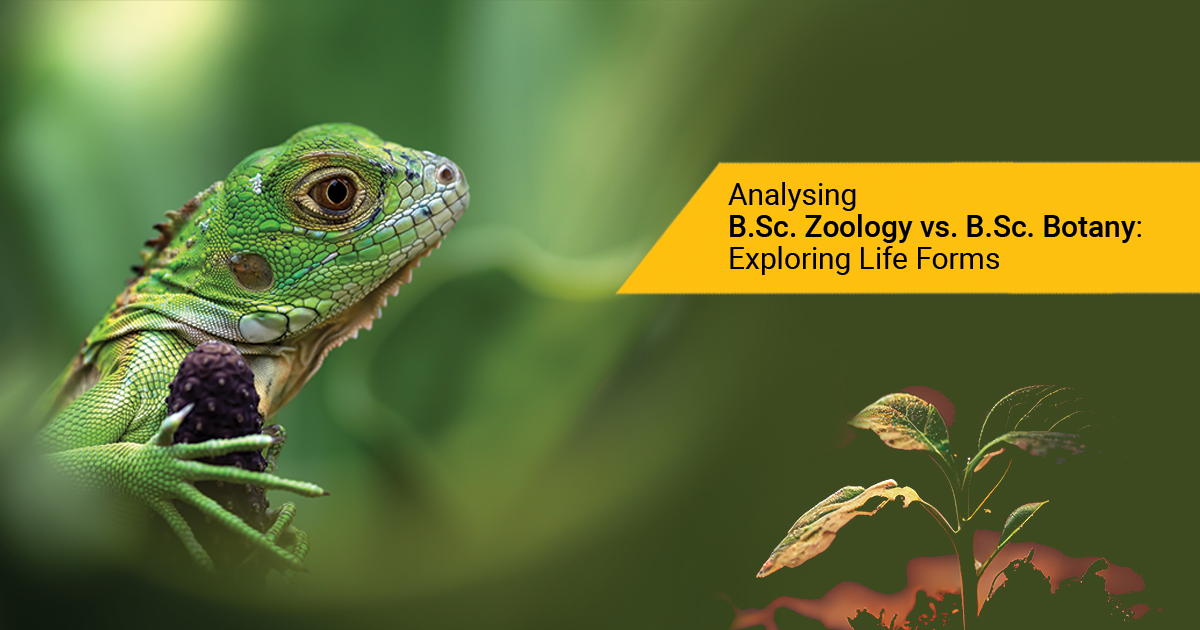Blog Detail


Analysing B.Sc. Zoology vs. B.Sc. Botany: Exploring Life Forms
07-10-2024

Life sciences is a broad field that includes many different disciplines, all adding to our knowledge of the living world. Two prominent branches in this field concentrate on different areas of biology: zoology and botany. Graduates in zoology and botany significantly contribute to our understanding of life on Earth and are essential in tackling issues like food security, climate change, and biodiversity loss. Choosing between B.Sc. Zoology and B.Sc. Botany can be a challenging decision for aspiring students. Both disciplines fall under the broader biology umbrella but offer distinct focuses and career paths.
B.Sc. Zoology is the study of animals, ranging from microscopic organisms to complex vertebrates. Anatomy, physiology, genetics, ecology, evolution, and behaviour are just a few subjects it covers. The opportunity to solve the mysteries surrounding the animal kingdom is one of zoology's primary attractions.
The B.Sc. Botany programme, conversely, is centred on the study of plants. The smallest algae and the tallest trees are all included in this area. The curriculum offers a comprehensive grasp of the plant world by covering ecology, genetics, taxonomy, physiology, and anatomy. Plant anatomy and morphology are integral components, helping students decipher the structure and function of various plant parts.
Course duration
B.Sc. Zoology programmes typically have a standard duration of three years, with each year divided into two semesters. The structure often includes core courses, elective courses, and practical components. The three-year duration allows for a comprehensive exploration of various aspects of zoology, from animal physiology to evolutionary biology.
Similarly, B.Sc. Botany programme spans three years, following the semester system. The duration is designed to give students a thorough understanding of plant biology, including subjects like plant physiology, taxonomy, and ecology. The three-year timeframe allows for a balanced integration of theoretical knowledge and practical skills.
Curriculum
The B.Sc. Zoology curriculum is designed to provide a comprehensive understanding of the animal kingdom. The three-year programme typically starts with foundational courses such as Introduction to Zoology and Cell Biology. Students delve into more specialised subjects, including Animal Physiology, Genetics, and Animal Behavior. The programme offers elective courses allowing students to explore specific areas such as Marine Biology or Entomology. Practical components, including laboratory work and field studies, are woven throughout the curriculum, enhancing hands-on skills. Research projects and a capstone experience contribute to a holistic educational journey.
B.Sc. Botany focuses on studying plants, offering a diverse curriculum, and introducing students to fundamental topics like Plant Anatomy and Cell Biology. Plant Physiology, Ecology of Plants, and Mycology form the core of the curriculum. Through elective courses, students can specialise in areas such as Ethnobotany or Plant Biotechnology. Zoology, practical sessions, including plant dissections and field trips, are integral to learning. The curriculum culminates in research projects, consolidating theoretical knowledge with hands-on application.
Career opportunities
A B.Sc. in Zoology opens the door to diverse career opportunities in wildlife conservation, zoos, research institutions, and veterinary science. Graduates can pursue careers in research, conservation, education, and more. The skills acquired in B.Sc. Zoology, such as critical thinking, research, and problem-solving, are transferable across various professions.
- Zoologists contribute to understanding and preserving biodiversity, managing wildlife, and even working in veterinary science
- Research scientists conduct research on various aspects of animal behaviour, physiology, ecology, and genetics
- Wildlife biologists work with conservation organisations to study, monitor and develop strategies for preserving and managing endangered species in their natural habitats
- Ecologists examine the relationships between organisms and their environments, and contribute to conservation efforts by studying ecosystems, biodiversity, and the impact of human activities on the natural world
Additionally, a B.Sc. in Zoology can be a stepping stone for further studies in specialised fields like marine biology, entomology, or veterinary science.
A B.Sc. in Botany opens up diverse career paths in agriculture, environmental conservation, pharmaceuticals, and horticulture.
- Botanists play a vital role in ecological conservation, studying the impact of human activities on plant life and proposing sustainable solutions
- Biotechnology researchers contribute to the pharmaceutical industry by discovering new plant medicinal compounds
- Plant taxonomists specialise in identifying, classifying, and naming plant species
- Ecologists study the relationships between plants and their environments
- Environmental consultants assess the impact of human activities on the environment, including plant life, and provide recommendations for sustainable practices and conservation efforts
- Educators teach students at various levels about plant biology, and inspire the next generation of botanists
In conclusion, both B.Sc. Zoology and B.Sc. Botany offers exciting journeys into the realms of life on Earth. Ultimately, the right choice comes down to personal interests and career goals. Whichever path you choose, a degree in either B.Sc. Zoology or B.Sc. Botany lays the groundwork for a fulfilling career contributing to your understanding of the natural world. The choice is yours, and the world of biology eagerly awaits your exploration!